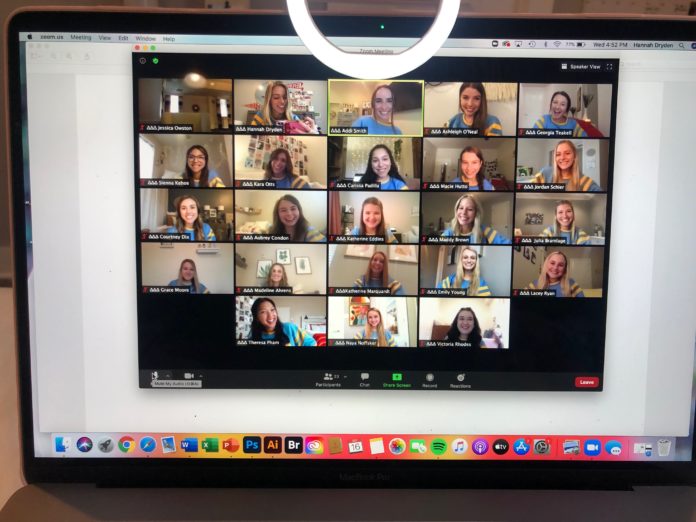
By Sarah Pinkerton | Staff Writer
Due to continued restrictions on large in-person gatherings, Panhellenic Previews will be held virtually for the remainder of the fall semester.
On Monday, session one of the first round of the virtual previews, which was scheduled from 5:00 p.m. to 6:45 p.m., was canceled due to technical difficulties. Matt Burchett, director of student activities, said that the process that was developed for the meeting was taking too long to efficiently host the meeting.
“Panhellenic, like many of our student organizations, continue to adjust traditional in- person programs to virtual delivery,” Burchett said.
Alpha Chi Omega, Alpha Phi, Chi Omega, Kappa Kappa Gamma and Zeta Tau Alpha were set to meet potential new members during that time.
Southlake freshman Madelyn Murphy signed up to attend session one and said she was looking forward to meeting three of the chapters that she hasn’t gotten to meet yet.
“After waiting 30 to 40 minutes, I ended the call because I needed to study for other classes and had plans later that night,” Murphy said.
Session two on Monday continued as normal and so did both sessions on Wednesday with the Pi Beta Phi, Alpha Delta Pi, Delta Delta Delta and Kappa Alpha Theta chapters.
Murphy also said that she was notified that the canceled session would be rescheduled after the end of all the sessions.
Potential new members are able to sign up for two weeks from five options. Each of these weeks will have two dates that the student will attend. These dates are further split up into Session 1 and Session 2. Potential new members are being asked to sign up prior to the preview they wish to attend.
Potential new members will receive a Zoom link through Baylor Connect for each chapter, and they can pick and choose which to attend and for how long. When they are done with a particular sorority, they just return to connect and click on a new link to move on.
With most online-formatted events, some people say it’s harder to connect with others. Murphy said that speaking with people over Zoom makes it harder for her to open up.
“I know I am a pretty outgoing person, but even being on Zoom, I am not really able to show my full personality,” Murphy said.
She said she is excited to see what other events will be planned throughout the fall. However, some organizations have begun to transition to in-person events.
Monday was the first day that certain sponsored student organizations were able to begin hosting in-person meetings. Sponsored is defined as university-funded and advised. However, this does not include individual chapters within the Panhellenic Council.
Burchett said that while the Panhellenic Executive Council as a whole is considered a sponsored group, the individual chapters within it are not. Therefore, the individual chapters are unable to host in-person events at this time.
“We continue to evaluate the health and safety of our community to determine the viability of student organization events and meetings,” Burchett said.
The Panhellenic Council will continue hosting their events online until further notice.
For sponsored organizations, Baylor’s Interim COVID Policies must be followed during in-person meetings and capacity is based on tent or room capacity.
Dennis Nolan, director of Environmental Health and Safety, said that they are looking into holding these face-to-face meetings outside as much as possible. Social distancing guidelines will also be implemented, and they are restricting food from being served at events.
“Things like that, at least initially, until we get a better idea of various transmission or if we start seeing increases in COVID positivity,” Nolan said.
Madelynn Lee, graduate apprentice in the department of Multicultural Affairs, said requests for in-person sponsored student organization events will go through Baylor Connect as normal.
“Final event approval will depend on the current COVID-19 numbers at the scheduled time of the event,” Lee said.
President Livingstone said that the university is doing a lot of work to start face-to-face meetings with the right kind of structures to ensure the safety of those involved.
She said that the number of positive cases and rate of transmission is going down right now, and that the university is aiming to find the best balance of opportunities for students that don’t create more positive cases.
“That’s kind of what we’re in the planning phases for right now, is what’s the right phase-in model over a period of time that begins to give those face-to-face opportunities, but does it in a way that we can monitor and make sure it’s safe before we expand it even further over time,” Livingstone said in an interview last week.





